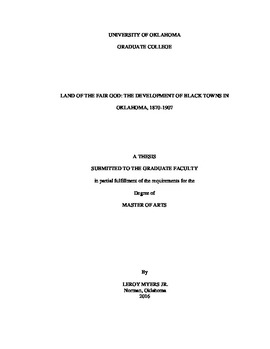| dc.contributor.advisor | Metcalf, R. Warren | |
| dc.contributor.author | Myers Jr, Leroy | |
| dc.date.accessioned | 2016-05-09T12:47:51Z | |
| dc.date.available | 2016-05-09T12:47:51Z | |
| dc.date.issued | 2016 | |
| dc.identifier.uri | https://hdl.handle.net/11244/34584 | |
| dc.description.abstract | Oklahoma’s All Black Town Movement is important to contextualize larger black migration patterns during the nineteenth century. Oklahoma was at the center of black migration from surrounding states. In addition, it played an important role in the development of the Back-to-Africa Movement. Although both movements within the state were not large scale, black movement in and out of Oklahoma attracted media attention. Within this narrative, Native American law influenced how the federal government defined blackness throughout Oklahoma and created a debate concerning the definition of the term “freedman” in the United States following the Civil War. Analyzing the many facets of Oklahoma’s All Black Town Movement helps scholars understand race relations, economics, built environments, and nationalism. | en_US |
| dc.language | en_US | en_US |
| dc.subject | History, Black. | en_US |
| dc.subject | History, United States. | en_US |
| dc.subject | History, Oklahoma | en_US |
| dc.title | Land of the Fair God: The Development of Black Towns in Oklahoma, 1870-1910 | en_US |
| dc.contributor.committeeMember | Evans, Sterling | |
| dc.contributor.committeeMember | Keppel, Ben | |
| dc.date.manuscript | 2016-05-06 | |
| dc.thesis.degree | Master of Arts | en_US |
| ou.group | College of Arts and Sciences::Department of History | en_US |
| shareok.nativefileaccess | restricted | en_US |
